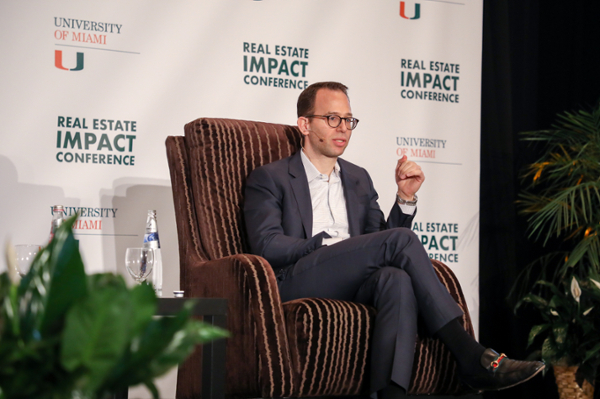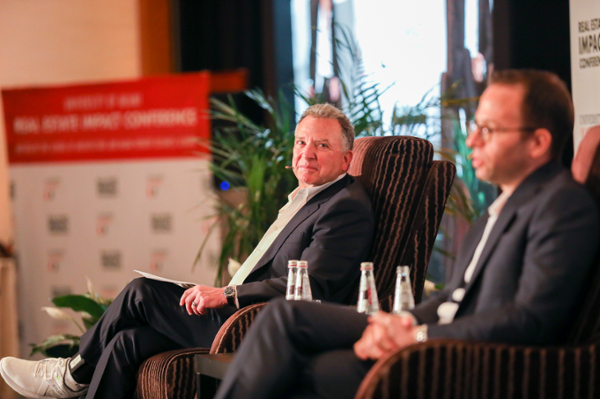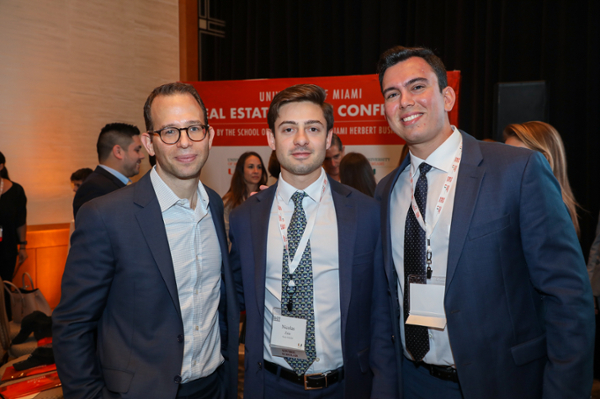 Without question, the novel coronavirus COVID-19 will impact real estate markets around the world, according to Matthew Cherwin, treasurer and chief investment officer, JP Morgan Chase & Co.
Without question, the novel coronavirus COVID-19 will impact real estate markets around the world, according to Matthew Cherwin, treasurer and chief investment officer, JP Morgan Chase & Co.
“Several weeks ago, I would have said the coronavirus is no different than the seasonal flu,” said Cherwin, who was took part in a discussion on “Macro Trends and Opportunities in Global Markets” with Steve Witkoff, chairman and CEO, Witkoff. “But to see how the virus is affecting our economy, just look around. Airlines are pulling back and companies are cutting back on nonessential travel. A lot of discretionary spending will go away.”
Cherwin began his presentation by highlighting JP Morgan Chase’ commitment to serving the region. “Florida is very important to us,” he noted. “Along with 400 branches in the state, including 78 in Miami, we support resiliency, housing awareness and financial education initiatives.” Cherwin also showed a video of the demolition of JP Morgan Chase’s high-rise corporate headquarters in Manhattan.
 As manager of JP Morgan Chase’s $2.7 trillion balance sheet, Cherwin said he has to prepare for a wide range of possibilities, including the potential impact of the coronavirus. “Don’t talk yourself into hoping what will happen. You have to bring reality into your projections,” he said.
As manager of JP Morgan Chase’s $2.7 trillion balance sheet, Cherwin said he has to prepare for a wide range of possibilities, including the potential impact of the coronavirus. “Don’t talk yourself into hoping what will happen. You have to bring reality into your projections,” he said.
While having the Dow Jones Industrial Average drop by 1,000 points before breakfast is not a good feeling, the downturn has similarities to December 2018, Cherwin said. “There are a range of outcomes to consider, and I think there is a 25 percent probability the Fed funds rate will go to zero by the end of the year.”
Cherwin added that the downturn in the early 2000s related to the SARS virus resulted in postponements of capital spending with little long-term economic impact. “Now, our economy has a lot of discretionary service spending and that will simply go away.”
In terms of economic impact, Cherwin said the virus could create a “U”-shaped recovery – however, the upward slope will not be as steep as the downturn. “Hopefully, medicine and science can mitigate this, but there will be a continuing impact on corporate revenues and costs.”
Cherwin added that he doesn’t like to be asked, “Where are we in the economic cycle?” He said he would love to know the answer to that question, and added that what typically ends an expansion is an unforeseen systemic shock. “Cycles don’t die of old age,” he said.
 Commercial real estate was considered a stable, inflation-protected asset before the coronavirus arrived, Cherwin said. Real estate development was coming back, as well. “Now, we have to look at what happens with demand, as well as with interest rates, borrowing costs and the availability of capital.”
Commercial real estate was considered a stable, inflation-protected asset before the coronavirus arrived, Cherwin said. Real estate development was coming back, as well. “Now, we have to look at what happens with demand, as well as with interest rates, borrowing costs and the availability of capital.”
Witkoff then asked about the credit markets. “Right now they have been relatively stable and the moves on spreads have not been that dramatic,” Cherwin said. “However, the prudent thing is to be prepared and look at how a possible change would affect your business.”
During the question and answer period, an attendee asked Cherwin about the impact of the 2020 presidential election on the markets. He said, “We have a long distance to travel before November. Voters are looking for someone to believe in, and we will have to wait and see what happens in the next few months.”



 Without question, the novel coronavirus COVID-19 will impact real estate markets around the world, according to Matthew Cherwin, treasurer and chief investment officer, JP Morgan Chase & Co.
Without question, the novel coronavirus COVID-19 will impact real estate markets around the world, according to Matthew Cherwin, treasurer and chief investment officer, JP Morgan Chase & Co. As manager of JP Morgan Chase’s $2.7 trillion balance sheet, Cherwin said he has to prepare for a wide range of possibilities, including the potential impact of the coronavirus. “Don’t talk yourself into hoping what will happen. You have to bring reality into your projections,” he said.
As manager of JP Morgan Chase’s $2.7 trillion balance sheet, Cherwin said he has to prepare for a wide range of possibilities, including the potential impact of the coronavirus. “Don’t talk yourself into hoping what will happen. You have to bring reality into your projections,” he said. Commercial real estate was considered a stable, inflation-protected asset before the coronavirus arrived, Cherwin said. Real estate development was coming back, as well. “Now, we have to look at what happens with demand, as well as with interest rates, borrowing costs and the availability of capital.”
Commercial real estate was considered a stable, inflation-protected asset before the coronavirus arrived, Cherwin said. Real estate development was coming back, as well. “Now, we have to look at what happens with demand, as well as with interest rates, borrowing costs and the availability of capital.”